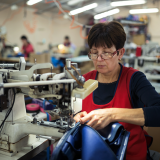In 2024, Eurofound continues its national monitoring of trends and developments in industrial relations, social dialogue, collective bargaining and working life regulations and outcomes.
To support European social dialogue, in 2024 the Agency plans to publish studies on the representativeness of social partner organisations in six sectors: construction, extractive industries, chemical sector, road transport including urban public transport, postal and courier services, and graphical industries. In addition, studies are ongoing on the following sectors: agriculture, temporary agency work, ports, maritime transport, tanning and leather, footwear, sugar, inland waterway transport, central government administration, railways and commerce. Eurofound continues its work on initiatives to support capacity building for effective social dialogue. In 2024, the Agency launches a new phase of Tripartite Exchange Seminars in collaboration with the European Training Foundation, Cedefop and the European Environment Agency.
Eurofound carries out its annual exercise of examining the involvement of national social partners in policymaking, in the context of the European Semester process and the Recovery and Resilience Facility, which in 2024 includes findings on the role of tripartite discussions held in Economic and Social Councils in Member States having such bodies. The contribution made by sectoral social partners to the implementation of reforms and investments included in the Recovery and Resilience Plans is also analysed, looking at policy processes that link European and national policy agendas.
Eurofound’s EU PolicyWatch database continues to capture relevant policy initiatives by governments, social partners and other actors, including those taken to mitigate the socioeconomic consequences of the war in Ukraine, as well as those related to the twin transition.
Work on outcomes in collective bargaining agreements beyond the topic of pay concludes in 2024 and the results and dataset are planned for 2025. Research also concludes on how larger increases in statutory minimum wages affect collective bargaining and collectively agreed wages for low-paid groups.
Eurofound collaborates with the European Institute for Gender Equality in 2024 to investigate further experiences with the implementation of gender pay transparency measures, with a focus also on those Member States that have recently introduced new legislation, and how the ‘work of equal value principle’ is defined and implemented.
The annual reviews on minimum wages and on working time in the EU continue in 2024. The working life country profiles are also being updated. The ongoing monitoring of industrial relations systems includes regular updates to the European Industrial Relations Dictionary.





































